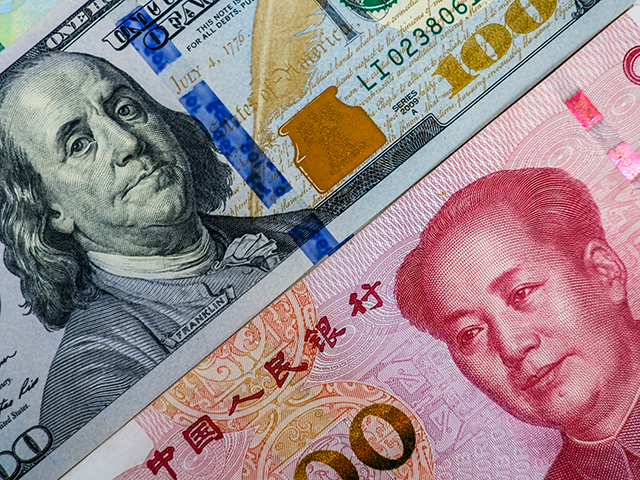Argentine Economy Minister Sergio Massa is in Brazil on Monday to discuss the details of an agreement with radical leftist President Luiz Inácio Lula da Silva that would allow Argentina to pay for Brazilian imports using the Chinese yuan instead of the U.S. dollar, the Argentina state-run Télam news agency reported.
Both Argentina and Brazil’s leftist governments have made significant efforts throughout the year to decouple themselves from the U.S. dollar and replace it with the Chinese yuan in their trading operations with China.
Argentina, under departing leftist President Alberto Fernández, is currently enduring a dire economic situation that has nearly depleted its U.S. dollar foreign reserves. The country signed an agreement with the Chinese Communist Party in April to stop using dollars to pay for Chinese imports and embrace the yuan instead. Argentina has also begun to pay its over $40 billion debt to the International Monetary Fund (IMF) in yuan in favor of the dollar as of June.
In March, Brazil signed a similar agreement with China to discard the U.S. dollar and embrace the yuan in bilateral trade.
According to Télam, Massa — who is also the Argentine leftist government’s presidential candidate in the upcoming October election — will discuss the agreement’s details with Lula on Monday afternoon. Massa will also reportedly hold a meeting with Brazilian Finance Minister Fernando Haddad prior to his encounter with Lula.
If signed, Argentina will be able to pay for Brazilian imports using yuan obtained from a currency swap line that Argentina set up with China. The swap, initially secured in November, was renewed for an additional three-year period and expanded from its initial $5 billion to $10 billion in June. Brazilian Finance Minister Haddad explained that the mechanism to be used is a direct conversion from the yuan to the real by the state-owned Banco do Brasil that will amount to up to $140 million.
“Brazilian exporters can have some flow of sales of their products with 100 percent guarantee,” Haddad said last week. “For Brazil, there is no problem, because the exchange rate will be made with the yuan per [Brazilian] real and this also assures the National Treasury that there is no risk of default.”
While Argentina is Brazil’s third largest business partner after China and the United States, it is the main buyer of Brazilian industrialized products, representing 4.6 percent of Brazil’s total exports in 2022.
Télam further reported that the proposal of paying for Brazilian imports in yuan came from the Brazilian government. According to the Argentine state-owned news agency, the agreement will seek to “maintain the rhythm of income of Brazilian inputs that are essential for the national industry,” while also “optimizing” the amount of limited U.S. dollar foreign reserves that the Argentine Central Bank has at its disposal. Last week, the IMF’s executive board completed its fifth and sixth reviews of its program with Argentina, issuing an immediate disbursement of approximately $7.5 billion to the South American nation.
The Argentine economy minister and leftist presidential candidate will also reportedly discuss with both Lula and Haddad matters pertaining to Argentina’s upcoming adhesion to the China-led BRICS economic and security bloc expected on January 1, 2024. BRICS — a coalition initially made up of Brazil, Russia, India, China, and South Africa — announced it would accept requests to join from six countries last week: Argentina. Egypt, Ethiopia, Iran, Saudi Arabia, and the United Arab Emirates. Lula, representing Brazil, was the biggest proponent of Argentina’s inclusion in the China-led bloc.
Massa will also reportedly discuss other bilateral matters with Lula and Haddad, such as the opening of agricultural markets, the tender for the second section of the Néstor Kirchner Gas Pipeline between both countries and matters pertaining to the administration and maintenance of the International Bridge of Integration, which connects the Brazilian town of São Borja with the Argentine city of Santo Tomé, among other topics.
Christian K. Caruzo is a Venezuelan writer and documents life under socialism. You can follow him on Twitter here.

COMMENTS
Please let us know if you're having issues with commenting.